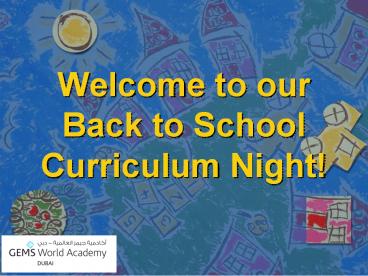Welcome to our Back to School Curriculum Night! - PowerPoint PPT Presentation
1 / 14
Title:
Welcome to our Back to School Curriculum Night!
Description:
... Water Minibeasts Tell me a story The Year Ahead Academically Role of Play in ... Communication How can we work together? All classroom ... No official homework ... – PowerPoint PPT presentation
Number of Views:134
Avg rating:3.0/5.0
Title: Welcome to our Back to School Curriculum Night!
1
Welcome to our Back to School Curriculum Night!
2
The Plan for Tonight
- A little about your teaching team
- The GWA approach to education
- Our class Essential Agreements
- The year ahead academically
- Communication
- How you can support
3
A Little About the KG1 AJ Teaching Team
4
GWA Approach to Education
- Inquiry based depending on childrens natural
curiosity - Challenged according to what students are ready
to learn next (developmental approach) - Focus on differentiation, activity based, small
group and individualized learning
5
How We Know What Students Have Learned
- Prior knowledge to drive inquiry
- Assessment (observations)
- Process oriented more often than product
(reflection of learning) - Portfolios (shows progression throughout the
year). Kids can reflect on their work. - Student Led Conferences (later in the year)
6
Class Essential Agreements
PRINCIPLED BALANCED RISK-TAKER
- Embody the Learner Profile
- Our classroom essential expectations fosters
shared responsibility. - What we are encouraging and how you can help at
home (consistency) - Independence , confidence and positive social
interactions
KNOWLEDGEABLE INQUIRER
COMMUNICATOR REFLECTIVE
OPEN-MINDED CARING THINKER
7
Transdiscipliary Themes of IB Curriculum
- We do 4
- Who We Are (Senses)
- How the World Works (Water)
- Sharing the Planet (Minibeasts)
- How We Express Ourselves (Tell Me A Story)
8
The Year Ahead Academically
- Units of Inquiry overview
- Our senses (Who we are)
- Central Idea We use our senses to find out about
ourselves, each other and the environment - We will be inquiring into the following
- The five senses
- How we use our senses to learn about the world
- Why senses are important and the impact of their
absence - Our other units of inquiry
- Water
- Minibeasts
- Tell me a story
9
The Year Ahead Academically
ICT Ipads Promethean boards Computers
Swimming
Library
PE
Math Number Shape space Measurement
Pattern function Data Handling
Music
Language Oral communication (listening and
speaking) Reading Writing
Art
10
Role of Play in Early Childhood
- Play provides opportunities to explore, create,
develop social skills, role-play, express
themselves, learn about emotions, release stress,
test limits, take risks, and enjoy themselves - Play supports both the academic and social
aspects of learning through a childs
perspective. - Teachers role is to act as the facilitator to
guide students in generating their own questions
about their learning and help them locate the
resources they need to find their own answers.
11
Communication
- How can we work together?
- All classroom news and upcoming events will be
posted on the Weebly site. - http//gwakgone.weebly.com/
- Many ways to be in touch i.e face-to-face and
email - Ask questions as they come up we have an open
door policy
12
Supporting Learning at Home
- How parents can help
- Independence is key
- At home dressing alone, setting the table,
taking responsibility of their school bag, quick
goodbyes at the school door. - No official homework in KG1
- Encourage questions/ inquiry through
- modeling (answer a question with a question).
- Talk to your child about their day, ask specific
questions rather than general
13
EC Teaching and Support TEAM
Vice Principal Ms. Huson
Margaret Sikora Music Teacher
Martin Hamilton Swimming Teacher
Neil Clark ICT Teacher
Ms. Nina Garza Councillor
Emma Hamilton Art Teacher
Ms. Anita EC Librarian
Olly Olerenshaw PE Teacher
14
General Information
- October/November
- February
- April
- June
- Centres are our way of formative assessment. We
can meet your child where they are at, as opposed
to forcing them to be at a certain level by a
certain time. - We de-emphasise paperwork. We have centres
(practical activities) instead of worksheets.































